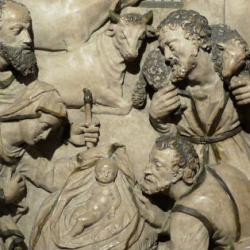The other day in my class on Hamlet I drew attention to a point I have needed to make consistently about the importance of consistency and integrity.
It related to the integrity of Shakespeare as a dramatist. Shakespeare’s integrity has allowed his reputation to endure the flights of fashion for over four hundred years. He was not simply ‘true to himself’, as Polonius would instruct Hamlet. He was true to an unchanging reality.
Shakespeare’s plays continue to teach and to please because human nature is unchanging. For, as Dr. Johnson put it in his Preface, ‘Nothing can please many, and please long, but just representations of general nature.’
Shakespeare is not merely a great technician of language, or a keen analyst of human psychology. He did not ‘invent’ humanity, as Harold Bloom would have it, and would find no praise in the suggestion he had. He would summarily reject Scottish philosopher David Hume’s ‘fact-value distinction’ – that we cannot derive statements about what ought to be from what is – as a variety of sophistry.
Shakespeare was a moral realist.
When his Hamlet declares ‘there is nothing either good or bad, but thinking makes it so’, he is not assenting to Hume’s skepticism, or to the nihilism of power politics. Hamlet is condemning the moral and cultural relativism that has corrupted the judgment of his disloyal friends Rosenkrantz and Guildenstern.
Arising from the morality play tradition of medieval theatre, Shakespeare recognized it as his duty not only to delight his audience, but to inculcate moral truth. This moral truth was woven into the entire cosmos, the ‘general nature’ Johnson justly notes Shakespeare justly represents.
If the idea strikes us as old-fashioned today, it is only because Shakespeare acknowledges what we have perversely been schooled to ignore. It is what all the great books teach and common sense has ever observed.
He also recognized what some would have us now reject. We do not self-identify our nature or construct our morality. It is in fact human nature to imitate. Were that not so, no one would go to a teacher, since teaching itself would be impossible.
The artist’s capacity to dramatize truth for others therefore burdens him with special responsibility. What is rewarded and what is punished on stage must comport with fundamental justice.
For ‘all the world’s a stage’. Life imitates art, and art imitates life.
Nowhere is this standard of justice more important to uphold than in depicting humanity’s perverse predilection towards self-contraction, self-abasement, and ruin. It seems that it is human nature to be ‘unnatural’ to itself. Sin makes it possible to deceive, mislead, and even break all bonds of due obligation to God and man.
Shakespeare’s great villains are object lessons
Machiavellian politics of the sort exemplified in House of Cards – virtue-signalling in order to achieve power – is condemned by Shakespeare in the rise and fall of his tragic villains. In this, he differs from the TV series, because for all their superficial similarity to Shakespeare’s villains, Frank and Claire Underwood’s perfidity continues. But in Shakespeare’s plays, those who practice such moral relativism do not flourish long, and often fall to the very vices they condemn.
Observing this aspect of Shakespeare’s work doesn’t only afford us a clear commentary on the conduct of today’s politicians, or the acting community.
It also has a corollary in education. When teachers refuse to fail students who clearly fail to make the grade, or reward them for being activists for the ‘right causes’, they do them no kindness. It isn’t only because they aren’t insisting they master the basics. They are punishing them by revealing that their own authority – and thus society’s – is unrelated to their moral integrity. And in their rewards they are thus taught to believe in belief, not in the truth.
There is a reckoning to be had for this subjectivism. As G.K. Chesterton put it, ‘The terrible danger at the heart of our society is that the tests are giving way. We are altering, not the evils, but the standards of good by which alone evils can be detected and defined.’
Should we wonder then when we read that student ‘social justice warriors’ are now turning upon the postmodern educators that have led them to imbibe in cultural relativism?
They have learned their lesson. If there is no morality, there is only unjust authority.
They needn’t believe in that. In the name of the equality, they want power.
The better way is the way of integrity. But that depends on our moral realism. As Charles Colson once put it, ‘leaders do not lead through their own example of virtue and character cannot inspire sacrifice for the common good.’










